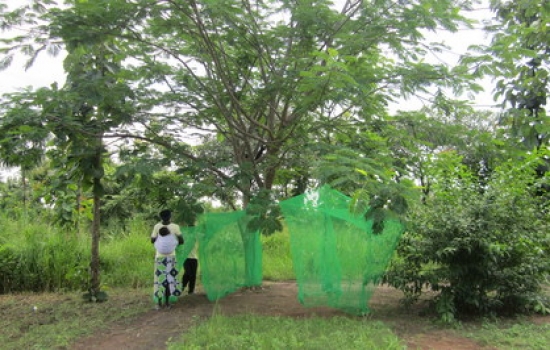Copyright © TMS Global
TMS Global
PO Box 936559
Atlanta, GA 31193-6559
800.478.8963
Our EIN number or Taxpayer Identification Number is 58-1546441.

Lynn and Sharon Fogleman are both family physicians. They spent 10 years serving as doctors in Kenya and 14 years at the Red Bird Clinic in Kentucky. They opened a Mission Society field in South Sudan in 2012, where they partner with the East Africa Conference of The United Methodist Church. They teach a Community Health Evangelism program in South Sudan, which has one of the poorest health care situations in the world.
Here, Sharon shares the challenges and successes of the Imagine No Malaria campaign and how it is changing lives in South Sudan.
So many wonderful people have worked hard to raise funds for The United Methodist Church's health campaign, "Imagine No Malaria" (INM). The goal of this project is to break the cycle of serious illness and death from the most deadly disease in Africa – malaria.
Most people in the US have heard of malaria, but it is difficult to comprehend the impact of this disease on communities unless you have lived in Africa for a while. In Africa, one person dies every minute from malaria. It is easy to feel overwhelmed by the magnitude of the problem.
However, when someone gives $10 to INM, it is multiplied by other peoples' donations to fund INM grants throughout Africa. These projects procure long-lasting, insecticide-treated mosquito nets and anti-malaria medications, as well as promote community awareness programs. The South Sudan UMC Health Board and UMCOR - South Sudan were privileged to receive their first INM grant in late 2013.
The programs were designed to target Lasu Payam, a region of South Sudan. My husband, Lynn, and I have been privileged to work in collaboration with the UMC here since March 2012, serving with The Mission Society. Although we knew about the INM program previously, we have been blessed to be a part of implementing this project over the past year.
In October 2013, we began training government health workers and communities on the risks of malaria, the proper diagnosis and treatment, and methods of prevention. Medicines were procured to prevent malaria in pregnant women, and to treat malaria in clinics and hospitals.
First, 200 community volunteers from the smaller regions of the Payam were trained by UMCOR staff on all aspects of malaria. Then the volunteers went door-to-door to register all families, the number of "sleeping places" in the compound, and whether any nets were currently being used. Once the first 10,000 nets were received by UMCOR, the estimated nets needed for an area were pre-positioned for distribution.
Next, community volunteers went door-to-door distributing the nets. By using laminated picture cards, they taught members of each household about malaria, the proper use of nets, and the importance of cleaning their compounds to avoid any mosquito-breeding areas. The volunteers even returned the next day to review the educational materials and to actually hang the nets.
Because of bad roads, rains, poor transportation options, and the fact that most families live deep in the bush, this distribution work was slow and labor-intensive. But this was first time citizens of Lasu Payam had received nets in such a personal way.
Slowly, 20,388 mosquito nets were distributed door-to-door! Reports are that families are using the nets this time because they understand the facts about malaria. Now that all of Lasu Payam has nets, the incidence of severe malaria and deaths from malaria in this area is reducing!
Several of us who worked on the campaign were in a village doing follow-up work a few days ago. A man who lives in a small village nearby came up to me and said, "I saw the UMC vehicle and came to tell you, we in the community are so thankful for you and UMCOR, because we now have mosquito nets and drugs to treat malaria. You have done a lot!" That is truly music to our ears!
Only time will tell what impact the INM project will have on the families in Lasu Payam. But we are proud to say that God is praised as communities feel empowered to attack this deadly disease and begin to imagine no malaria in the future!
The Imagine No Malaria (INM) project through UMCOR is assisting Health Boards in Africa to end deaths from malaria by 2015. Contributions can be made through UMCOR, Advance #3021190.
Thank you for responding to this call to share the love of Jesus with others in Africa!